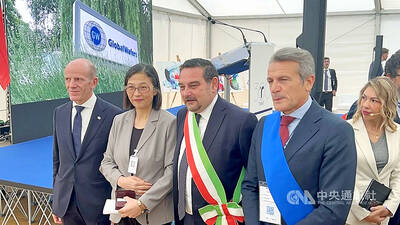E-commerce operator Kuobrothers Corp (創業家兄弟) on Thursday said that it is to buy Mobix Corp (松果購物), its 53 percent owned e-commerce subsidiary, through a share swap scheme.
Kuobrothers plans to issue 6,631,724 new shares to buy out Mobix shares that it does not own, based on an exchange ratio of 0.91 Kuobrothers shares for one Mobix share.
The move is to allow the two companies to improve resource consolidation in an increasingly crowded e-commerce environment, Kuobrothers said.
It is in line with trends for e-commerce firms to form conglomerates, Kuobrothers chairman Jerry Kuo (郭書齊) said.
INTEGRATION
“Our third-quarter figures were not that great, but after the integration, we will see results,” Kuo said.
Kuobrothers reported a net loss of NT$6.28 million (US$217,904) in the third quarter, compared with a net profit of NT$4.67 million a year earlier.
In the first three quarters of this year, net profit totaled NT$28.14 million, down 19.74 percent from NT$35.06 million in the same period last year.
Earnings per share (EPS) in the period fell to NT$1.13 from NT$1.41.
Revenue in the first 10 months fell 7.08 percent year-on-year to NT$3.8 billion, company data showed.
Mobix has yet to release its earnings for last quarter. It reported a net profit of NT$22.13 million in the first two quarters, up 316.8 percent from NT$5.31 million a year earlier, or a rise in EPS to NT$1.4 from NT$0.37.
Revenue in the first 10 months increased 26.31 percent to NT$285.56 million from a year earlier.
Kuo said that the two firms were “fighting their own battles” previously.
While the merger would let them consolidate resources, he intends for their brands to remain separate.
“Both companies have their own members and brand value, it would be a shame to lose that,” he said.
The share swap would be completed by June, after which Mobix would be delisted from the Taipei Exchange, Kuobrothers said.

RECYCLE: Taiwan would aid manufacturers in refining rare earths from discarded appliances, which would fit the nation’s circular economy goals, minister Kung said Taiwan would work with the US and Japan on a proposed cooperation initiative in response to Beijing’s newly announced rare earth export curbs, Minister of Economic Affairs Kung Ming-hsin (龔明鑫) said yesterday. China last week announced new restrictions requiring companies to obtain export licenses if their products contain more than 0.1 percent of Chinese-origin rare earths by value. US Secretary of the Treasury Scott Bessent on Wednesday responded by saying that Beijing was “unreliable” in its rare earths exports, adding that the US would “neither be commanded, nor controlled” by China, several media outlets reported. Japanese Minister of Finance Katsunobu Kato yesterday also

‘DRAMATIC AND POSITIVE’: AI growth would be better than it previously forecast and would stay robust even if the Chinese market became inaccessible for customers, it said Taiwan Semiconductor Manufacturing Co (TSMC, 台積電) yesterday raised its full-year revenue growth outlook after posting record profit for last quarter, despite growing market concern about an artificial intelligence (AI) bubble. The company said it expects revenue to expand about 35 percent year-on-year, driven mainly by faster-than-expected demand for leading-edge chips for AI applications. The world’s biggest contract chipmaker in July projected that revenue this year would expand about 30 percent in US dollar terms. The company also slightly hiked its capital expenditure for this year to US$40 billion to US$42 billion, compared with US$38 billion to US$42 billion it set previously. “AI demand actually

Jensen Huang (黃仁勳), founder and CEO of US-based artificial intelligence chip designer Nvidia Corp and Taiwan Semiconductor Manufacturing Co (TSMC, 台積電) on Friday celebrated the first Nvidia Blackwell wafer produced on US soil. Huang visited TSMC’s advanced wafer fab in the US state of Arizona and joined the Taiwanese chipmaker’s executives to witness the efforts to “build the infrastructure that powers the world’s AI factories, right here in America,” Nvidia said in a statement. At the event, Huang joined Y.L. Wang (王英郎), vice president of operations at TSMC, in signing their names on the Blackwell wafer to

Taiwan-based GlobalWafers Co., the world’s third largest silicon wafer supplier, on Wednesday opened a 12-inch silicon wafer plant in Novara, northern Italy - the country’s most advanced silicon wafer facility to date. The new plant, coded “Fab300,” was launched by GlobalWafers’ Italian subsidiary MEMC Electronics Materials S.p.A at a ceremony attended by Taiwan’s representative to Italy Vincent Tsai (蔡允中), MEMC President Marco Sciamanna and Novara Mayor Alessandro Canelli. GlobalWafers Chairwoman Doris Hsu (徐秀蘭) said the investment marked a milestone in the company’s expansion in Europe, adding that the Novara plant will be powered entirely by renewable energy - a reflection of its